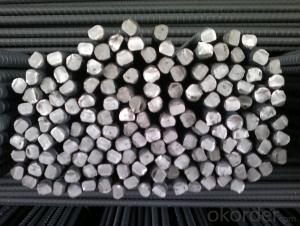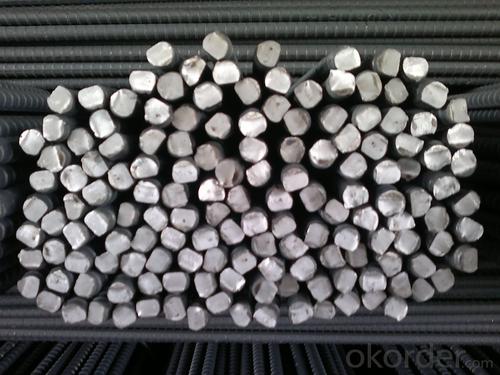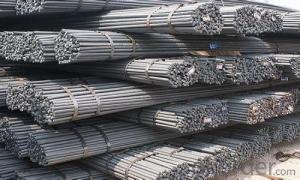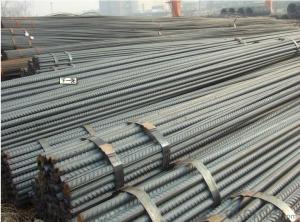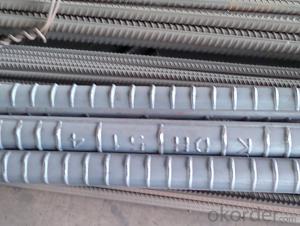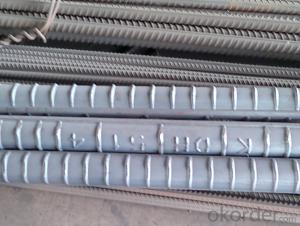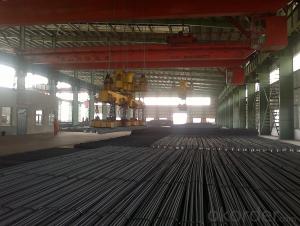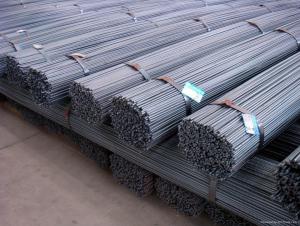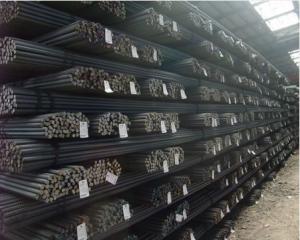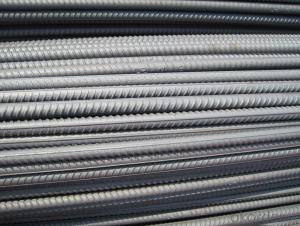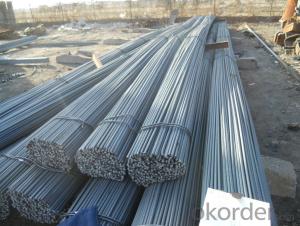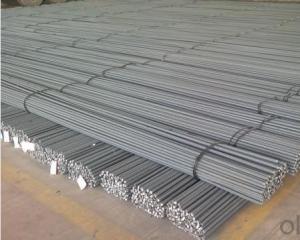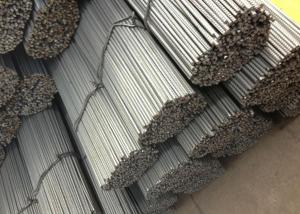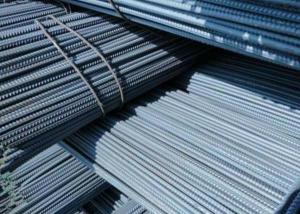GB Standard HRB400, 500 Hot Rolled Deformed Steel Rebars
- Loading Port:
- Shanghai
- Payment Terms:
- TT or LC
- Min Order Qty:
- 100 m.t.
- Supply Capability:
- 200000 m.t./month
OKorder Service Pledge
OKorder Financial Service
You Might Also Like
OKorder is offering GB Standard HRB400, 500 Hot Rolled Deformed Steel Rebars at great prices with worldwide shipping. Our supplier is a world-class manufacturer of steel, with our products utilized the world over. OKorder annually supplies products to African, South American and Asian markets. We provide quotations within 24 hours of receiving an inquiry and guarantee competitive prices.
Product Applications:
GB Standard HRB400, 500 Hot Rolled Deformed Steel Rebars are ideal for structural applications and are widely used in the construction of buildings and bridges, and the manufacturing, petrochemical, and transportation industries.
Product Advantages:
OKorder's GB Standard HRB400, 500 Hot Rolled Deformed Steel Rebars are durable, strong, and wide variety of sizes.
Main Product Features:
· Premium quality
· Prompt delivery & seaworthy packing (30 days after receiving deposit)
· Can be recycled and reused
· Mill test certification
· Professional Service
· Competitive pricing
Product Specifications:
Manufacture: Hot rolled
Grade: HRB400 500etc
Certificates: ISO, SGS, BV, CIQ
Length: 6m – 12m, as per customer request
Packaging: Export packing, nude packing, bundled
Deformed Steel Bar | ||
Diameter (MM) | Cross Sectional Area (MM2) | Theorectical Weight (KG/M) |
6 | 28.27 | 0.222 |
8 | 50.27 | 0.395 |
10 | 78.54 | 0.617 |
12 | 113.1 | 0.888 |
14 | 153.9 | 1.21 |
16 | 201.1 | 1.58 |
18 | 254.5 | 2 |
20 | 314.2 | 2.47 |
22 | 380.1 | 2.98 |
25 | 490.9 | 3.85 |
28 | 615.8 | 4.83 |
32 | 804.2 | 6.31 |
36 | 1018 | 7.99 |
40 | 1257 | 9.87 |
HRB335
Grade | Technical data of the original chemical composition (%) | |||||||
C | Mn | Si | S | P | B | |||
HRB335 | ≤0.25 | ≤1.60 | ≤0.80 | ≤0.045 | ≤0.045 | >0.0008 | ||
Physics capability | ||||||||
Yield Strength(N/cm2) | Tensile Strength(N/cm2) | Elongation (%) | ||||||
≥335 | ≥490 | ≥16 | ||||||
HRB400
Grade | Technical data of the original chemical composition (%) | |||||||
C | Mn | Si | S | P | V | |||
HRB400 | ≤0.25 | ≤1.60 | ≤0.80 | ≤0.045 | ≤0.045 | 0.04-0.12 | ||
Physics capability | ||||||||
Yield Strength(N/cm2) | Tensile Strength(N/cm2) | Elongation (%) | ||||||
≥400 | ≥570 | ≥14 | ||||||
FAQ:
Q1: Why buy Materials & Equipment from OKorder.com?
A1: All products offered byOKorder.com are carefully selected from China's most reliable manufacturing enterprises. Through its ISO certifications, OKorder.com adheres to the highest standards and a commitment to supply chain safety and customer satisfaction.
Q2: How do we guarantee the quality of our products?
A2: We have established an advanced quality management system which conducts strict quality tests at every step, from raw materials to the final product. At the same time, we provide extensive follow-up service assurances as required.
Q3: what is the difference between actual weight and theoretical weight?
A3: All the section steel has two weights: actual weight and theoretical weight. Actual weight is the weighing out when the product delivered from the mill. Theoretical weight is calculated by pieces. The invoice can be based on each of them as your request.
Images:
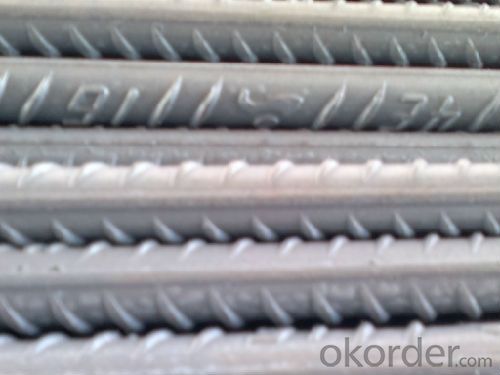
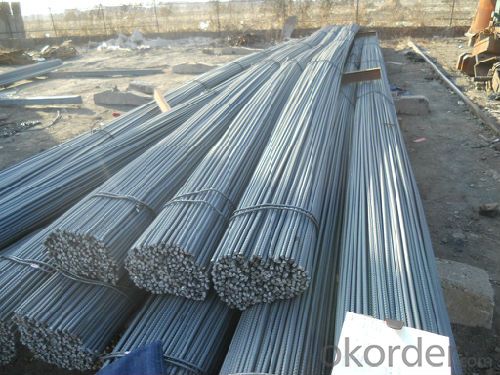
- Q: How do steel rebars contribute to the fire resistance of a structure?
- Steel rebars, or reinforced bars, enhance the fire resistance of a structure by providing structural stability even at high temperatures. When exposed to fire, the steel rebars act as a heat sink, absorbing and distributing heat away from the surrounding concrete. This slows down the rate of temperature rise, minimizing the risk of structural failure. Additionally, the presence of steel rebars helps prevent concrete spalling by reducing the internal pressure caused by the expansion of heated concrete.
- Q: What is the effect of exposure to acidic soil on steel rebars?
- Exposure to acidic soil can have a detrimental effect on steel rebars. The acidic nature of the soil can cause corrosion and degradation of the steel rebars over time. This corrosion weakens the rebars, reducing their structural integrity and potentially leading to structural failures in constructions where they are used. Regular inspections and appropriate measures, such as protective coatings or using non-corrosive materials, are necessary to prevent or mitigate the negative effects of acidic soil on steel rebars.
- Q: Can steel rebars be used in underground construction or tunnels?
- Yes, steel rebars can be used in underground construction or tunnels. Steel rebars are commonly used in these applications to provide strength and reinforcement to concrete structures, ensuring their stability and durability in challenging underground environments.
- Q: What are the guidelines for the proper installation of steel rebars?
- The proper installation of steel rebars is crucial for ensuring the structural integrity and durability of reinforced concrete structures. Here are some guidelines to follow for their proper installation: 1. Planning and Design: Before beginning the installation, it is important to have a detailed plan and design in place. This includes determining the required rebar size, spacing, and configuration based on the structural requirements and specifications. Consulting structural engineers and adhering to local building codes and regulations is essential. 2. Cutting and Bending: Rebars should be cut and bent accurately according to the design specifications. Proper tools such as rebar cutters and benders should be used to ensure clean cuts and precise bends. Any damaged or corroded rebars should be discarded and replaced. 3. Cleaning and Preparation: The surface of the rebars must be free from any contaminants like rust, oil, dirt, or loose scales before installation. Cleaning the rebars using wire brushes or air blasting is recommended to ensure proper adhesion between the rebar and concrete. 4. Placement and Positioning: The rebars should be placed and positioned accurately as per the design drawings. They should be securely tied or supported using tie wires or rebar chairs to maintain the desired spacing and alignment. Splices should be made in accordance with the design requirements and properly lapped to ensure continuity and strength. 5. Concrete Cover: The rebars should be adequately covered with concrete to protect them from corrosion and provide fire resistance. The concrete cover thickness should meet the design specifications and local building codes. Proper spacing between rebars and formwork should be maintained to allow proper concrete flow and consolidation. 6. Anchorage and Embedment: Adequate anchorage and embedment of rebars are essential for transferring loads and ensuring structural stability. Special care should be taken to provide proper hooks, bends, or mechanical anchorage at the ends of rebars as per the design requirements. The rebars should be properly embedded into the adjacent concrete elements to achieve the desired bond strength. 7. Inspection and Quality Control: Regular inspection should be carried out during the installation process to ensure compliance with the design specifications and quality standards. Any deviations or defects should be identified and rectified promptly. It is important to document the installation process and maintain proper records for future reference. By following these guidelines, the proper installation of steel rebars can be achieved, ensuring the structural strength, longevity, and safety of reinforced concrete structures.
- Q: What is the tensile strength of different grades of steel rebars?
- The tensile strength of different grades of steel rebars can vary, but generally, it ranges from 400 to 600 megapascals (MPa).
- Q: Can steel rebars be used in the construction of road bridges or flyovers?
- Yes, steel rebars can be used in the construction of road bridges or flyovers. Steel rebars are commonly used as reinforcement in concrete structures, including bridges and flyovers, due to their high strength and durability. The rebars help to enhance the structural integrity and load-bearing capacity of the concrete, making it suitable for supporting heavy traffic loads and resisting the forces experienced by road bridges and flyovers. Additionally, steel rebars provide increased resistance to corrosion, which is crucial in bridge constructions where exposure to environmental elements is significant. Overall, the use of steel rebars in the construction of road bridges and flyovers ensures their structural stability, longevity, and safety.
- Q: How do steel rebars contribute to the overall fire resistance of a structure?
- Steel rebars, also known as reinforcing bars, play a crucial role in enhancing the fire resistance of a structure. They contribute to the overall fire resistance in several ways. Firstly, steel rebars are typically made from a material known for its high melting point and excellent heat resistance. This means that even in the event of a fire, the rebars retain their structural integrity and do not deform or collapse easily. This is especially important in high-rise buildings where the temperature during a fire can reach extreme levels. Secondly, the presence of steel rebars helps to distribute heat evenly throughout the structure. When exposed to high temperatures, steel absorbs and conducts heat away from the fire source, preventing localized hotspots and minimizing the risk of structural failure. This redistribution of heat helps to maintain the stability and integrity of the building, providing occupants with valuable time to evacuate safely. Furthermore, steel rebars are often embedded within concrete, forming a composite material commonly referred to as reinforced concrete. The combination of steel and concrete creates a synergistic effect in terms of fire resistance. While steel has high tensile strength, concrete has excellent compressive strength. When exposed to fire, the concrete acts as a protective layer, slowing down the heat transfer to the steel rebars. This delay in heat transfer allows the steel to maintain its strength for a longer period, further enhancing the fire resistance of the structure. Additionally, steel rebars help to prevent the spread of fire by creating compartmentalization within the building. In the event of a fire, the reinforced concrete structure acts as a barrier, limiting the fire's ability to spread from one area to another. This containment of fire reduces the potential damage and allows emergency responders to control and extinguish the fire more effectively. In conclusion, steel rebars significantly contribute to the overall fire resistance of a structure. Their high melting point, heat redistribution capabilities, and combination with concrete create a reliable and durable fire-resistant system. By providing structural stability, preventing localized hotspots, and limiting the spread of fire, steel rebars play a critical role in ensuring the safety and protection of both the building and its occupants during a fire incident.
- Q: What is the maximum length of steel rebars available?
- The specific manufacturer and supplier are the determining factors for the maximum length of steel rebars available. Typically, steel rebars can be found in lengths that range from 6 meters (20 feet) to 18 meters (60 feet). These lengths are established based on various considerations, including transportation logistics, handling capacities, and industry standards within the construction sector. To ascertain the precise maximum length of steel rebars offered, it is crucial to seek guidance from the manufacturer or supplier.
- Q: How much is the minus difference per ton of thread steel?
- H, R, and B are the first letters in English for hot-rolled (Hotrolled), ribbed (Ribbed) and reinforced (Bars) three words. Hot rolled ribbed bar is divided into HRB335 (old No. 20MnSi), HRB400 (20MnSiV, 20MnSiNb, veteran, 20Mnti), HRB500 three brands.
- Q: How do steel rebars contribute to the overall resistance against natural disasters?
- Steel rebars contribute to the overall resistance against natural disasters by reinforcing structures such as buildings, bridges, and dams. They enhance the strength and stability of these structures, making them more resistant to earthquakes, hurricanes, and other natural calamities. Steel rebars increase the structural integrity, prevent collapse, and distribute the force of the disaster, reducing the extent of damage and protecting lives and property.
Send your message to us
GB Standard HRB400, 500 Hot Rolled Deformed Steel Rebars
- Loading Port:
- Shanghai
- Payment Terms:
- TT or LC
- Min Order Qty:
- 100 m.t.
- Supply Capability:
- 200000 m.t./month
OKorder Service Pledge
OKorder Financial Service
Similar products
Hot products
Hot Searches
Related keywords
